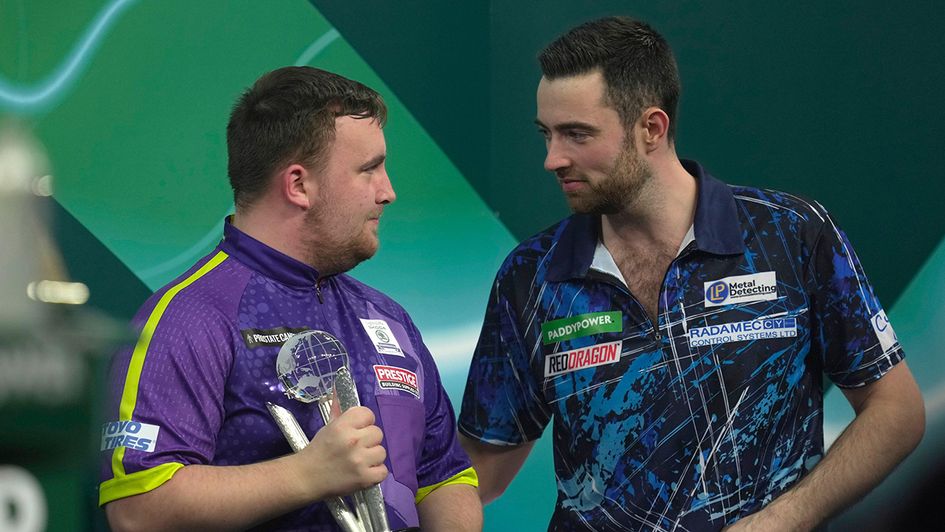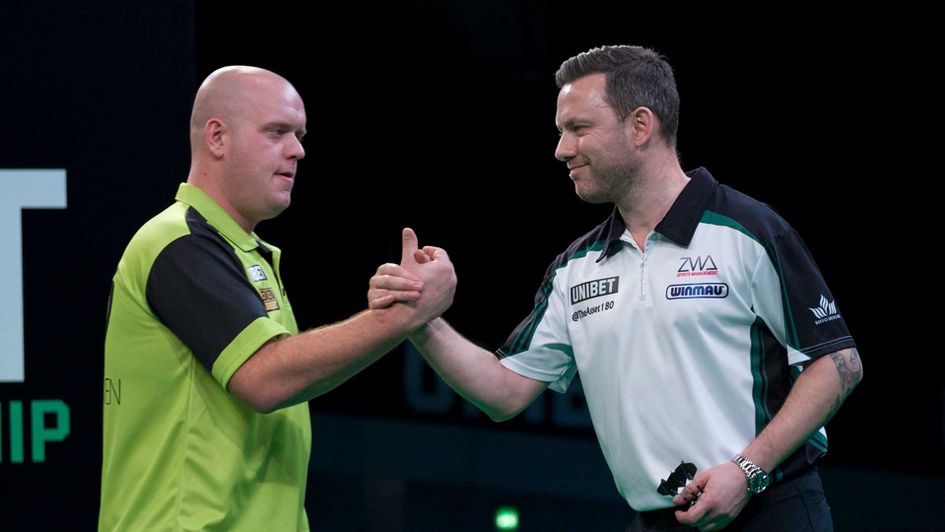How much does a darts player earn and are the top stars really enjoying a millionaire life of luxury? Paul Nicholson lifts the lid on the realities of playing for your livelihood.
* This column was originally written in 2024 but has become topical once again after the PDC announced the 2026 world champion will pocket an unprecedented £1,000,000 - an increase of £500,000 from what Luke Littler won in January. In total there will be a prize fund of £25million in the 2026 PDC season which is an increase of £7million. *
Let’s get one thing straight right away, being a dart player is not as luxurious as people think.
Sure, there are those big pay days and great moments where you think ‘yes, this is what I want to do for the next 20 years’ but ultimately there are times where you think ‘all I do is play darts, travel, pack suitcases and practice when I get home’.
There aren’t many millionaire darts players. They might have ‘won’ millions during their career but it doesn’t mean they have a million sitting in their bank accounts right now!
WATCH: HOW MUCH DO DARTS PLAYERS EARN
Remember that ridiculous tabloid article about Mervyn King during lockdown that claimed ‘millionaire darts player is now working as an Amazon delivery driver’? The million he’s earned is over 25 years!
We’re not talking about footballers here who earn guaranteed 100s of 1000s per week for several years.
We’re talking about honest sports people who have made a good living and a very small select few have made a lot of money.
How much does a player earn?
From a financial perspective, in order for you to have the time off to enjoy your earnings, you’ve got to be in the top 16 bare minimum, and preferably the top 10.
The public tend to grade a dart player – and their wealth – on what their prize money on the PDC Order of Merit is – although bare in mind that’s ‘just’ ranking money. They might say, for example, “He’s won £300,000 over the past two years so he’s on £150,000 a year!”
ALSO WATCH: NEW TOURNAMENT IDEAS IN DARTS
Does the darts calendar need a little more variation when it comes to tournament formats rather than the standard 501 played over legs? Here, former major winner and leading commentator Paul Nicholson joins Sporting Life darts expert Chris Hammer and host Dom Newton to runs through some ideas that could be popular with fans and players including a Royal Rumble and a Ryder Cup!
Firstly, the PDPA levy which every player has to pay from their prize money is 2%. Already that’s £6000 from that example. Then you have to pay your manager if you have one – most do - and that will be another percentage to pay out.
Managers or management companies arrange things like travel, accommodation and exhibition bookings etc to make a player’s competitive life easier but as a consequence they obviously have to pay for that service. Some players will still be paying for their travel and accommodation even if it’s being booked for them, although some will get that paid for through some sponsorship deals if high profile enough.
ALSO WATCH: BUILDING THE PERFECT DARTS PLAYER
Paul Nicholson joins Dom Newton and Chris Hammer to combine the talents of some of the greatest players past or present in an effort to create an unbeatable darting monster. We look at prolific 180 hitters, clinical finishers and show-stopping 100+ checkout merchants as well as other categories such as on nerves of steal, stage presence, crowd popularity and walk-on music.
All sponsorship deals and personal appearances etc are brokered by management so they will take a cut off that as well as the prize money.
Not everyone is on the same deal even if they have the same manager so it’s impossible to give you an exact figure and it is kept very secret, understandably.
But from my own experience, I gave my manager 20% of all my income from sponsorships and exhibition work. The percentage I paid for prize money was different but I don’t want to print that. I’ll save it for my book!
However, what I will say now is that when I won the Players Championship Finals, the top prize was £60,000. After I paid the levy, my agent and worked out what my tax would end up being, I effectively walked away with £22,000. Doesn’t sound quite as good now does it? This obviously doesn’t mean everyone is walking away with less than half and I was going through an extreme situation at the time, but it’s an example of how winnings aren’t as they seem.
ALSO WATCH: HOW TO BECOME A PRO DARTS PLAYER
Leading pundit and former major winner Paul Nicholson joins host Dom Newton and Sporting Life's darts expert Chris Hammer to discuss the 'darting pyramid', the importance of averages, how to crack Q School and other factors such as choosing sponsors, nicknames and walk-on music.
Be careful of the tax
A darts player declares how much money they’ve earned over the course of the year and the taxman takes his cut based on what kind of business you are. Most players are limited companies like me so we pay a fair amount of tax.
If you win £500,000 for becoming world champion then £10,000 goes to the players union and the rest will go into your bank account. You have to be careful and work out there and then what you know will eventually go to the taxman.
This is why Adrian Lewis got into some big issues before winning his first world title.
It wasn’t because he went overboard with his spending and bought lots of flash cars or anything like that – he just lost track of his finances. And by the end of the year when he was slapped with a massive tax bill he thought ‘oh, I should have saved more for this!’.
Adrian is the most well-known example of this but he’s certainly not the only one. I won’t name names but some have found themselves in much bigger financial difficulties despite earning a lot of prize money because they hadn’t thought enough about tax.
Earning through exhibitions
Exhibition fees are personal to every player based on their success level and their relevance, so it can be very hard to work out exactly what they earn exactly – and it should remain private.
The range of exhibition payments I’ve heard players earn in my career is anything from £250 to £20,000. For one night. But just to be clear, that latter amount is an extreme example if the promotion is significantly big and held in a large arena like one in Budapest recently which had around 7000 fans in attendance.
Those operating at the lower end of that scale will be players who have perhaps dropped off the circuit and are trying to stay part of the darting community. Whereas to get towards the higher end you really need to be a popular, recent major winner that can sell plenty of tickets.
Scroll down to continue the article
Don’t forget, just because a player can one day earn a few thousand for a night of exhibition work – there’s no guarantee that can continue unless they stay at the top, so you need to think of the pressure that goes with staying relevant and popular enough.
It’s all based on who you are right now. So Adrian Lewis, for example, may well be very popular still, but he’s certainly not commanding the same type of fee than when he was a reigning world champion. But having won it twice, he will always have that extra leverage with promoters than those who have never done that. Rightly so!
A player like Michael van Gerwen pretty much has the licence to charge whatever he wants – and the very best often have a fixed fee - but it’s down to the promoter to decide whether they can pay it or whether to negotiate.
Peter Wright doesn’t do many exhibitions at all – so the ones he does choose are big ones.
Ultimately ticket sales talk. If you put a poster up with a world champion on there, you will sell tickets. If you put two top 32 players on there without any major titles, you may struggle. Entertaining players like Joe Cullen and Devon Peterson are particularly prolific in these darts galas in Europe because they draw people in.
No income in darts is guaranteed – especially those who aren’t even high profile enough to get exhibition work - and can never be thought of as a standard wage like most jobs.
All this is great, but think of all your travel and time away from home when trying to fit in exhibitions with professional tournaments? It’s a lot of hours ‘work’.
Travel chaos
The top players rack up the air miles more than ever these days.
Earlier in May, there was a week when some of the Premier League stars played on Thursday night, then flew to Prague for the Czech Darts Open on the European Tour then to Budapest a few days later for a big exhibition on a Tuesday night, then to London for another Premier League night and then to Stuttgart for another European Tour event. That was their week! And they’ll be travelling to the other side of the globe in the coming months for the World Series tour.
Flying obviously isn’t as expensive as it used to be but they certainly won’t all be flying business class in luxury. They’ll mostly use the budget airlines to keep their costs down.
Imagine if you aren’t one of the top players who have banked a lot of prize money.
That said, in the past players like Chris Mason used to say if you went to America for a tournament and broke even, it was OK!
These days if Michael van Gerwen goes to the other side of the world, do you think he’d accept breaking even?!
How much does a dart player want?
A stock player will want to earn enough to just get by and maybe save enough to eventually own their own homes.
If you look at Kyle Anderson, he always said the only thing he wanted to play darts for was to buy a house for his family. It’s not about fancy watches, clothes and fast cars.
I admire that. These players have a talent and although it might not be enough to make millions, it can help them fulfil a dream to own a house.
No guarantees
One good earning year is no guarantee it will happen again in this crazy world of darts.
Just look at someone as talented as Rob Cross who has had a rollercoaster of a career in terms of winning majors in some years but then baron spells in others.
If you get yourself settled in life, eventually you do stop thinking about the money as much as before and instead focus on titles and ranking points, especially if you’ve got great sponsors who will be paying you enough to get by and pay some bills.
However, there are some who are playing hand to mouth, and that’s dangerous. Imagine going to an event knowing you had to play a game to pay your mortgage? I’ve been there myself and it’s not uncommon.
In 2009 I had £2000 in the bank and I went to a tournament in Ireland knowing it was a case of ‘win this or go back to Australia’.
I won £3000 that weekend and it changed everything (remember the usual deductions).
There are still players in these kind of desperate situations and I can’t imagine how the pressure must feel now with the standard of competition that it is today, even in the early rounds of events.
Nathan Aspinall was famously a prime example of this a few seasons ago when he had about £19 in his account and how his first run to the World Championship semi-finals and his UK Open triumph meant he didn’t have to worry about money anymore.
He became a different animal after those financial pressures went away and secured his family’s future with a house fully owned.
For me I wanted to make sure I won enough early in the year to pay the bills then I could attack the rest of the tournaments without any financial pressure and get more and more.
Saving for the future
If you polled every Tour Card holder and asked them if they pay into a pension scheme, I’d be surprised if as many as 10 of them said yes.
Current players are only starting to get on the bandwagon for saving for their futures in an astute way such as property or pensions.
Dart players are getting smarter but in the past many were too lavish with the prize money and they got found out and don’t have the wealth today that they should have had.
Darts: Related content
- 2025 Premier League Season
- 2025 PDC Darts Calendar
- How Littler won £1million in one season
- What's easier, a nine-darter or a 147?
- Watch: Ranking the major winners in history
- Watch: Royal Rumble and other new tournament ideas
- Watch: How much do darts players earn?
- Watch: Is Luke Littler the next Phil Taylor?
- Watch: Building the perfect darts player
- Watch: How to become a darts professional
- How legends would fare today
- Troubles and triumphs
- Tournament ideas for darts
- 'What If' moments in darts
- Agony of missed match darts
- Good, Bad, Ugly: Nicholson on darts shirts
- Referees in darts
- Calling the shots in darts
- Weird actions in darts
- Hidden talents in darts
- Superstitions in darts
- Routes to glory
- Paul Nicholson's five darts drills
- Paul Nicholson's five mental tips
- Paul Nicholson's five practice games
- Worst losers in darts
- World number ones in darts
- Best players never to be number one
- Five characters in darts
- Do averages lie?
- Greatest Tournaments Ever
- Paul Nicholson's Ally Pally tales
- Watch all the Ally Pally nine-darters
- Players everyone hates to face
- Players everyone loves to face
- How to make it as a pro?
- How much money do players earn?
- Greatest darts rivalries
- Rivalries to cherish
- Be canny with counting
- Phil Taylor's greatest display
- Greatest World Championship displays
- World Cup of Great Darts performances
- Sky Bet's darts odds










